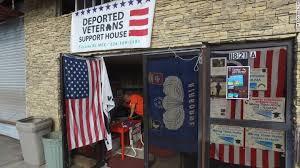Deported US Veterans in Mexico Pressed Into Service by Drug Cartels

By Debbie Gregory.
There are very few options for an immigrant veteran who’s been deported following a conviction for an aggravated felony to legally return to the U.S. It doesn’t help that many of these veterans have settled in dangerous border towns in Mexico, where jobs are scarce and crime pays.
Here, they run the risk of being pressed into service by the drug cartels, forced into a criminal lifestyle they would not choose of given the choice.
One option is for a deported veteran to return to the U.S. is to secure a presidential pardon, or one from the governor of the state they were convicted in. Although not a re-entry guarantee, it is a necessary step before re-applying for legal resident status.
And getting a pardon is the exception, rather than the rule. In other words, it’s nearly impossible.
The other option is to die. While not a feasible option for most, all veterans discharged under conditions other than dishonorable, even if they’ve been deported, are entitled to a military funeral and burial with full honors.
“The cartels are waiting for you,” said deported Army veteran Ivan Ocon. “They know you’re desperate. They know you’ve spent time in prison. … if they pick you up, there’s three ways it can go. They’ll kill you, recruit you, or kidnap you and hold you for ransom.”
Deported veterans wanting to return to the United States legally face the up-hill battle of persuading people to view them as former U.S. servicemembers who made mistakes, and did their time for those mistakes.
Deported Veterans Support House, a Tijuana-based nonprofit founded by Army veteran Hector Barajas, advocates for deported U.S. military veterans worldwide.
While the Department of Homeland Security doesn’t keep track of how many U.S. veterans have been deported, estimates put the number in the thousands. Barajas says his organization has helped 300 deported veterans scattered across 36 different countries.
Barajas has a small network of nonprofit groups, veterans organizations and individual volunteers that advocate for deported veterans and help them secure military pensions and benefits. But the main goal is to one day return them to the United States.
According to a 2016 report by the American Civil Liberties Union entitled “Discharged, Then Discarded,” the federal government’s failure to help naturalize immigrants serving in the U.S. military has led to the large number of deportations, all of whom were entitled to become citizens because of their service.
“Deported veterans were in the United States legally and sustained physical wounds and emotional trauma in conflicts as far back as the war in Vietnam,” the statement continued. “Once they returned from service, however, they were subject to draconian immigration laws that reclassified many minor offenses as deportable crimes, and were effectively banished from the country.”
Rep. Raúl M. Grijalva of Arizona introduced a bill, The Veterans Visa and Protection Act of 2017, that would prevent non-citizen service members and veterans from being removed from the United States unless they were convicted of a violent crime.
“They made a mistake, and many citizen veterans have made those same mistakes upon their return,” said Grijalva.
To date, the bill has been co-sponsored by 48 members of the House, all Democrats.


























